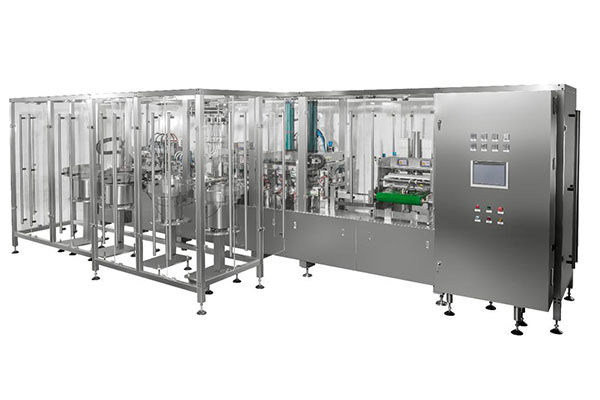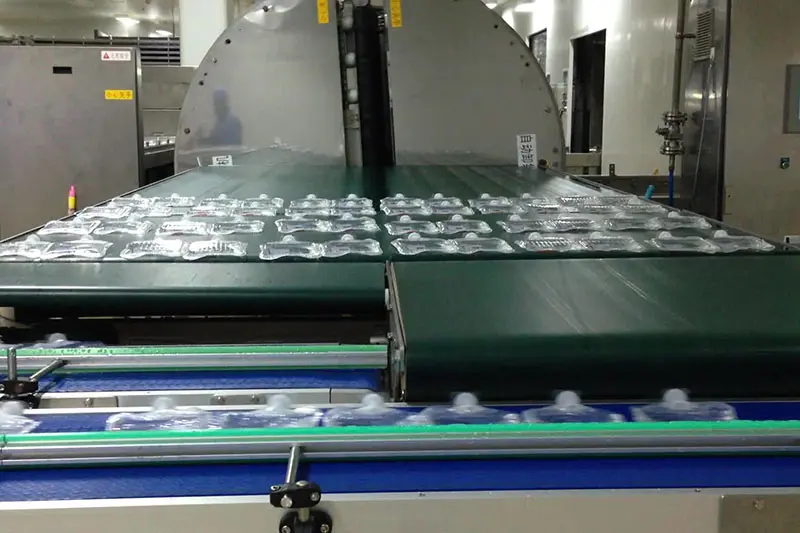
A non-PVC soft bag production line is a manufacturing system designed to produce soft bags from materials that do not contain Polyvinic Chloride (PVC). This technology is an innovative response to the growing demand for environmentally friendly and health-conscious alternatives to traditional PVC-based products.
The non-PVC soft bag production line operates in several stages. First, the non-PVC material, often a type of plastic known as polyolefin, is melted down and extruded into a film. This film is then cooled, cut, and shaped into bags. Once the bags are formed, they're filled with the intended product, sealed, and packaged for distribution.
The significance of non-PVC soft bag production lines in today's industrial landscape cannot be overstated. With increasing environmental regulations and consumer awareness about the potential health risks associated with PVC, industries are under pressure to find viable alternatives. Non-PVC soft bag production lines offer a solution that not only meets these demands but also provides opportunities for improved operational efficiency and cost savings.
These production lines are particularly crucial in sectors such as the medical field, where the use of non-toxic and sterile packaging is paramount. Similarly, in the food industry, non-PVC bags can help ensure food safety while also reducing environmental impact.
In essence, the non-PVC soft bag production line represents a shift towards more sustainable and health-conscious manufacturing practices, making it a vital component in the modern industrial landscape.
Benefits of Non-PVC Soft Bag Production Line
1. Environmental-friendly: One of the most significant benefits of non-PVC soft bag production lines is their environmental sustainability. PVC, or Polyvinyl Chloride, is a type of plastic that has been criticized for its negative environmental impact.
This includes issues with non-biodegradability and the release of harmful dioxins when incinerated. On the other hand, materials used in non-PVC production lines, such as polyolefins, are more eco-friendly. They are recyclable, produce fewer emissions during manufacturing, and do not release toxic chemicals when disposed of, making them a greener choice.
2. Operational efficiency: Infusion bag filling machine can enhance productivity in several ways. Due to the properties of non-PVC materials, they often require less energy to process compared to PVC, leading to faster production times. Additionally, non-PVC materials generally have a lower risk of producing faulty products, thereby reducing waste and increasing overall efficiency.
3. Quality and durability: Non-PVC materials used in these production lines are known for their superior quality and durability. They offer excellent chemical resistance, ensuring that the contents within the bags are not compromised. Furthermore, non-PVC bags demonstrate high strength and puncture resistance, which contributes to their longevity and reliable performance.
4. Cost-effective: While the initial investment in a non-PVC soft bag production line might be higher than traditional PVC lines, the long-term cost benefits are substantial. With greater operational efficiency and less waste, these production lines can lead to significant savings over time.
Moreover, as regulations around PVC usage tighten and consumer demand for eco-friendly products increases, businesses that invest in non-PVC technology may find themselves better positioned to avoid potential regulatory fines and meet market demands.
Non-PVC soft bag production lines offer an array of benefits that make them an attractive choice for businesses looking to improve their environmental footprint, enhance operational efficiency, deliver high-quality products, and achieve cost-effectiveness.
Applications of Non-PVC Soft Bag Production Line
1. Medical Field: The non-PVC soft bag production line has significant applications in the medical field. These bags are often used for packaging intravenous (IV) solutions, blood, and other biological fluids. The non-PVC materials used in these bags are biocompatible, meaning they do not react with the packaged solution or blood, ensuring safety and sterility. They also demonstrate excellent barrier properties against oxygen and moisture, maintaining the integrity of the packaged products. Furthermore, their high clarity allows for easy visibility of the contents, a critical factor in healthcare settings.
2. Food Industry: In the food industry, non-PVC soft bag production lines play a vital role in creating safe and efficient packaging solutions. The superior chemical resistance of non-PVC materials ensures that the food contents are not contaminated by harmful substances.
Additionally, their excellent barrier properties help preserve the freshness and quality of the food items, extending their shelf life. From packaging fresh produce to creating pouches for liquid foods and beverages, the uses of non-PVC bags in this sector are extensive.
3. Consumer Goods: Non-PVC soft bag production lines are also instrumental in producing everyday consumer goods like shopping bags, packaging materials, and more. These bags offer a more eco-friendly alternative to traditional plastic bags, aligning with the increasing consumer demand for sustainable products.
Moreover, their strength and durability make them an ideal choice for carrying heavy items, while their flexibility allows for easy storage.
The applications of non-PVC soft bag production lines span across multiple industries, helping businesses meet both operational needs and environmental responsibilities. By offering a safer, more sustainable, and efficient solution, these production lines are set to redefine the future of packaging and product delivery.
Non-PVC soft bag production lines offer a multitude of benefits that make them an attractive choice for businesses across various sectors. They provide an eco-friendly alternative to traditional PVC-based products, aligning with global trends towards sustainability and environmental responsibility. The operational efficiency of these production lines, coupled with the superior quality and durability of non-PVC materials, contributes to enhanced productivity and reduced waste.

Post time: Sep-27-2024


